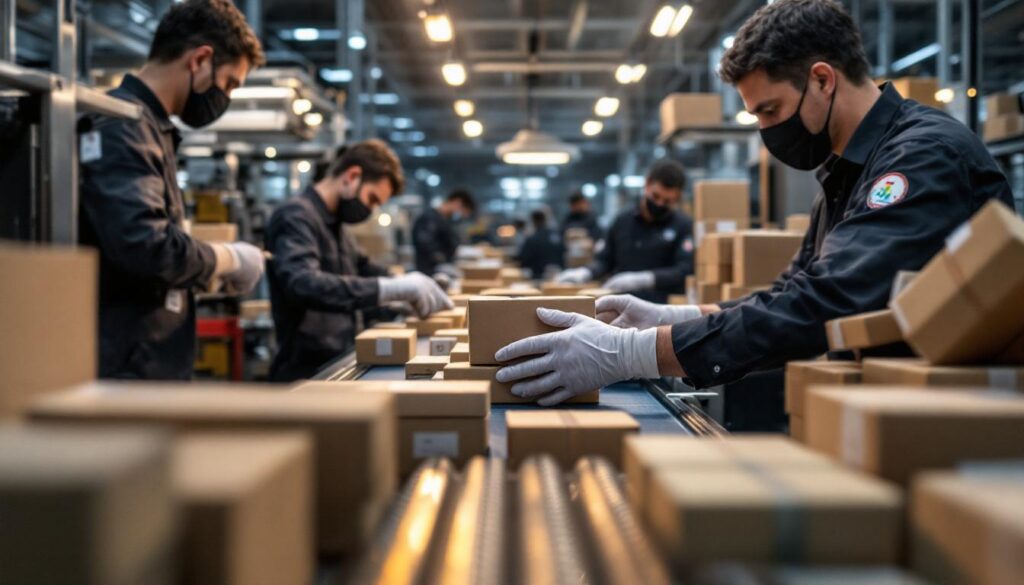![Repackaging Services Explained: What They Are and Who Needs Them [2025]](https://msl-indy.com/wp-content/uploads/2025/07/modern-industrial-repackaging-facility.jpg)
Repackaging Services Explained: What They Are and Who Needs Them [2025]
Every day, more companies see the need for reliable repackaging services as supply chains grow in size and complexity. Businesses from food and beverage to retail use these services to save time, maintain product quality, and adapt to changing customer demands. Repackaging services help companies create retail-ready products or break down bulk shipments into custom packs with efficiency and care.
As the market shifts and consumer needs change, a smart approach to packaging gives a real edge. In this post, you’ll find out exactly what repackaging services include, how they make operations smoother, and why so many industries count on them to keep products moving. Along the way, we’ll highlight examples and solutions trusted by experts, like those found in our MSL Indy Packaging Industries page. If you’ve been wondering whether your business could benefit, keep reading to see how repackaging might help you improve your bottom line.
What Are Repackaging Services?
Repackaging services involve taking products out of their original packaging and placing them into new or custom packaging formats. Companies use these services to deal with changes in order volumes, meet customer or retailer requirements, fix damaged shipments, or simply get bulk items ready for retail sale. With supply chains moving quickly, repackaging helps businesses stay flexible and keep goods looking fresh and appealing.
Breaking Down the Types: Primary vs. Secondary Repackaging
Understanding the difference between primary and secondary repackaging helps you decide what your product may need:
- Primary repackaging happens when a product is removed from its first container (like bottles, cans, or wrappers) and placed into new packaging that may touch the product directly. Example: Taking bulk candies from a large bag and placing them into smaller pouches for retail shelves.
- Secondary repackaging keeps the primary package intact but groups or rebrands those items for display or shipping. Example: Placing individually boxed shoe pairs into a branded case for a promotion.
By knowing which level your business requires, you can improve product presentation, comply with regulations, or both.
The Typical Repackaging Process
The process of repackaging isn’t just about moving items from one box to another. Here’s a quick look at how it works:
- Receiving and Inspecting: Items arrive at the facility and get checked for damage or missing pieces.
- Removing and Sorting: Workers take products out of original packaging (if needed), inspect again, and sort them based on repack needs.
- Preparing New Packaging: The new packaging is assembled, labeled, and ready for filling.
- Packing and Sealing: Products are carefully placed in new containers, sealed, and checked for quality.
- Labeling and Coding: All required labels, lot codes, and safety information are added.
- Final Quality Check: Each finished package gets inspected before being shipped out.
The result: crisp, retail-ready products that are safe, regulatory-compliant, and tailored for the next step in your supply chain.
Key Differences From Contract Packaging
While repackaging and contract packaging sometimes overlap, they’re not the same thing. Contract packaging covers a wider range of services and can include full product assembly, branding, fulfillment, and more. Repackaging is more focused on updating or correcting the packaging of goods already produced. If you’re looking for a partner who can help with both basic repackaging and broader packaging projects, check out the options on the Contract Packaging Services page.
Real-World Examples of Repackaging Services
You can spot repackaging services in action across many industries:
- Food and beverage: Separating large bulk boxes of snacks into smaller multi-packs for stores.
- Retail: Adjusting seasonal items, like putting together holiday gift baskets.
- E-commerce: Reboxing returns or multi-item orders for direct-to-consumer shipping.
- Pharmaceuticals: Rebagging pills into sample-size packs for doctor offices.
Every industry can use repackaging to solve a specific need, save money, or win new shelf space without starting from scratch.
For more insights into how repackaging fits into broader logistics and service models, you can see additional examples and details in the guide to Value-Added Services by 3PL Providers.
Why Businesses Use Repackaging Services
Repackaging services save time, cut costs, and help businesses adjust to whatever the market throws at them. Companies across food, retail, healthcare, and beyond use these services to keep things running smoothly and present products in the best possible light. When shelves need restocking, old packaging doesn’t meet standards, or individual items need sorting, repackaging steps in as a dependable solution. Let’s look at the main reasons companies rely on these services and how it shapes their bottom line.
Better Inventory Management
Product shortages and supply chain bottlenecks can throw inventory off balance. Repackaging services make it easier for businesses to break bulk shipments down into smaller, ready-to-sell units. This means:
- Quicker stock rotation—a big win for items with shorter shelf lives
- Easier inventory counting and tracking
- Flexibility to meet unexpected demand without waiting for a new production run
Smarter inventory control leads to fewer surprises, happier customers, and lower overall costs.
Improved Branding and Product Presentation
First impressions count, especially on the crowded retail shelf. Repackaging allows businesses to update designs and include promotions, seasonal branding, or multilingual labels—all without waiting for a new factory order. Benefits include:
- Staying current with market trends or holiday seasons
- Meeting retailer requirements for display or labeling
- Adding value with bundled deals or custom packs
If you want to see how industries refresh their shelf presence while keeping systems efficient, take a look at MSL Indy Packaging Industries for a deep dive into system-driven packaging solutions.
Regulatory Compliance
Rules and standards change fast, especially in industries like food, cosmetics, and healthcare. Sometimes, original packaging falls short of local or federal requirements. Repackaging services help businesses avoid recalls, fines, or wasted product by:
- Adding or updating required language and nutritional info
- Fixing barcodes, expiration dates, or allergy warnings
- Ensuring packaging meets specific retailer or state regulations
This quick turnaround can be the difference between keeping goods on shelves or losing key retail space.
Reducing Product Damage
Long shipments or mishandling can mean damaged outer packaging while the product inside is still good. Rather than tossing perfectly usable items, repackaging:
- Swaps out damaged boxes for fresh ones
- Catches and removes flawed units during the process
- Improves product appearance for e-commerce returns and resale
For industries most impacted by shipping damage, like food and health products, specialized services ensure goods look great and maintain integrity. Check how the Food and Beverage Industry Solutions approach these challenges for a real-world example.
Extending Product Shelf Life
With some products, how they’re packed has a direct impact on how long they last. Repackaging into airtight pouches or adding moisture-absorbing inserts can boost shelf life and cut waste. This means:
- More usable product reaches the customer
- Retailers enjoy fewer expired or spoiled goods
- Less loss for the manufacturer or distributor
It’s a simple change that brings a clear competitive edge.
Making Compliance and Branding Updates Easy
Whenever there’s a need to adapt rapidly, repackaging offers the flexibility to keep products relevant and safe. Whether that means reacting to a new law, fixing a label error, or adding a QR code for traceability, these services provide an efficient workaround without the need for costly re-runs.
In short, repackaging services let companies work smarter, reduce waste, and make products shine—inside and out. This flexibility explains why so many businesses of every size view repackaging as a core part of their supply chain strategy.
Industries That Rely on Repackaging Services
Repackaging services are not just a convenience—they are a key business solution for many industries. Some sectors face high product turnover, strict regulations, or regular marketing shifts. Others need to deliver goods that not only look great on shelves but also meet customer safety and quality standards. Let’s explore how industries like food and beverage, pharmaceuticals, and e-commerce turn to repackaging for results that matter.
Repackaging in the Food and Beverage Industry
Few industries rely on repackaging services as much as food and beverage. This field demands fresh, eye-catching, and safe packaging every single day. Companies often move products from bulk shipments into smaller, ready-to-sell packs. Why? The reasons are clear:
- Preserving Freshness: Food must travel far but arrive fresh. Repackaging into airtight, food-grade containers helps prevent spoilage and keep items at their best.
- Safety and Compliance: Labels need to list ingredients, allergens, and nutrition facts—sometimes in multiple languages. If the info changes or regulations shift, repackaging is the smart fix.
- Seasonal and Promotional Needs: Snacks and beverages often get custom packaging for holidays, sales, or retailer requests. Quick turnarounds allow brands to react to trends or retailer demands without missing a beat.
Think of bulk bags of nuts being portioned into snack-size pouches, or a winery creating mixed case gift packs for the holidays. Every detail counts, from resealable closures for freshness to bright labels for retail impact. For more details on safe, compliant, and flexible solutions tailored to this industry, visit industries served by MSL Indy.
Pharmaceutical and Healthcare Repackaging Needs
In the pharmaceutical and healthcare sectors, repackaging is about more than just presentation—it is about safety, traceability, and following the law. Regulators set strict rules for how medicines and supplements are packed and labeled. Changes in dosage, new compliance language, or healthcare sample requests can call for a complete packaging refresh.
Key reasons these industries depend on repackaging include:
- Regulatory Requirements: Labels must stay current with FDA, GMP, and international rules. If something changes, like dosing information, quick repackaging keeps products legal and available.
- Quality and Safety: Medications and devices require tamper-evident features and batch tracking. Repackaging processes add coded seals, updated expiry dates, or child-resistant features.
- Market and Distribution Needs: Hospitals and clinics often need medications and supplements in single-serve units or custom assortments—a task perfectly handled by specialized repackaging.
Consider a pharmacy needing single-dose blister packs, or a supplement brand switching label language for export. These quick shifts are possible thanks to reliable repackaging. Learn more about industry-specific processes in the Pharmaceutical Contract Packaging Solutions guide.
E-Commerce and Retail Repackaging Solutions
E-commerce and retail move at a fast pace, where packaging must adapt to keep up with trends, promos, and marketplace returns. As product lines change and orders shift from warehouse to doorstep, repackaging services are the go-to option for brands wanting to stay agile.
Top ways e-commerce and retail use repackaging:
- SKU and Promotion Changes: Online sellers often mix and match products in response to flash sales or new trends. Quickly building new bundles or swapping labels keeps stores current.
- Managing Damaged Goods: Returned or shelf-worn products with perfectly fine items inside can be salvaged, inspected, and repacked for resale instead of hitting the landfill.
- Retail Display and Compliance: Retailers may set strict packaging standards or require specific promotional displays. Repackaging ensures every box fits those needs, from shrink-wrapped gift baskets to retail-ready cartons.
Picture an online beauty store grouping skin care samples for a subscription box, or a big-box retailer needing seasonal candy displays. Behind each offer, efficient repackaging services keep operations sharp and inventory moving. For insights into fulfillment strategies, check the ecommerce fulfillment services page.
Repackaging services bring flexibility, compliance, and smart inventory control across these sectors, serving as a practical solution for real business needs.
How to Choose the Right Repackaging Service Provider
When you invest in repackaging services, picking the right provider is more important than you might think. You’re not just hiring someone to move products from one box to another—you’re trusting them with your brand, compliance needs, and customer satisfaction. A good repackaging partner will help you manage risk, control costs, and set clear expectations before any packaging line starts moving.
Let’s break down the key factors you should look for so you can feel confident your products are in safe hands.
Experience and Industry Expertise
Not every packaging problem is the same. The best repackaging service providers have years of experience working with products like yours. Whether you’re selling snacks, healthcare products, or fast-moving retail goods, experience helps providers spot problems before they cause delays or cost you money.
Look for:
- A track record with similar products or industries
- Familiarity with rules for food, beverage, pharmaceutical, or other regulated categories
- Problem-solving skills born out of real-world practice
Seasoned providers know the hidden pitfalls in every project, so you won’t pay for rookie mistakes.
Certifications and Regulatory Compliance
Staying on the right side of the law matters as much as protecting your brand. Choose a partner with all required certifications and a commitment to quality. Third-party audits, up-to-date facility licenses, and staff training should be non-negotiables.
Common certifications to check for:
- Food Safety (such as SQF or FDA registration)
- GMP (Good Manufacturing Practices) for health and pharma work
- State and federal compliance with labeling and packaging law
If a provider can’t show you proof, keep looking. For a deeper dive into setting expectations in packaging contracts, see the advice in Contract Packaging Agreement Essentials.
Scalability and Capacity
Business needs can change overnight, especially if you run promotions or have seasonal spikes. Your repackaging partner should handle both short runs and large, ongoing projects without hassle. Ask about:
- Number of production lines and shift capacity
- Turnaround times during busy periods
- Flexibility for last-minute volume changes
A provider that struggles with your growth will only slow you down.
Technology and Facility Standards
Modern repackaging relies on more than just tape and boxes. Automation, digital tracking, and advanced labeling tools ensure accuracy and product safety at every step. It’s smart to ask about:
- Automated equipment for sorting, labeling, or sealing
- Inventory management and barcode systems
- Real-time order and shipment tracking
- Quality assurance systems
Facility tours and visible technology investment prove a provider takes your products seriously.
Value-Added Services
Some companies offer much more than repackaging, helping you with full product kitting, labeling, or light assembly. These extra touches save you precious time and money while keeping everything under one roof. When comparing providers, check if they also deliver:
- Kitting and bundling
- Boxing and display preparation
- Secondary packaging options
- Returns inspection and rework services
Integrated solutions let you create a one-stop relationship that’s simple and efficient.
Customer Support and Communication
Responsiveness can make or break your experience. Fast answers, proactive updates, and a clear project manager can prevent small snags from turning into big headaches. Look for providers who offer:
- Easy points of contact
- Regular progress reports
- Quick response to issue resolution
Good communication is a sign you’ve found a true partner, not just a vendor.
Professional Standards and Examples
It’s smart to check a provider’s reputation and learn how they set quality standards in practice. For a look at what professionalism looks like in the industry—and what you should expect—take a few minutes to review Contract Packaging Solutions by MSL Indy. They set a clear benchmark for what the best in the business offer.
Final Tips: Make the Right Call
Choosing a repackaging service isn’t just about price. It’s about quality, flexibility, and trust. Check references, tour the facility if you can, and use online resources to explore more about effective contract packaging strategies and industry-tested solutions.
Taking these steps now will set your products up for success—and help you sleep better knowing your goods are in skilled hands.
Are Repackaging Services Right for Your Business?
Deciding if repackaging services will help your company takes more than a quick look at costs. You need to think about your products, how you sell and distribute them, and the scale and speed of your orders. The right repackaging approach can solve everything from bottlenecks in your supply chain to branding challenges. Here’s how to figure out if these services make sense for your business.
Product Type and Packaging Needs
Some products are just a better fit for repackaging services than others. Items that ship in bulk, have tight freshness needs, or often need label updates stand out as prime candidates.
Consider these product types that often benefit most:
- Perishable goods (food, snacks, supplements)
- Consumer goods with frequent branding updates
- Items that require custom kitting or bundling
- Products needing added compliance or multi-language labels
If your line-up matches any of these, professional repackaging can save you headaches and protect your brand’s reputation.
Order Volume and Frequency
High volumes, seasonal peaks, or frequent product launches often create a need for fast, flexible repackaging solutions. Small businesses might use repackaging to run limited promos. Larger companies may need it just to keep up with order spikes or evolving retail requirements.
Ask yourself:
- Do you have large, fluctuating orders?
- Are you processing returns or restocking?
- Do you need to change packaging on short notice?
If you answered “yes” to any of these, outsourced repackaging can keep your operations nimble without extra staff or facility investment.
Distribution Model Considerations
The way you get products to your customers matters. If you’re shipping direct to stores, dealing with multi-channel retail, or working with e-commerce, repackaging can align your product presentation and compliance with channel-specific needs.
Questions to consider:
- Are you serving retailers with unique packaging specs?
- Does your e-commerce packaging need to reduce shipping damage or improve unboxing?
- Do regulations or retailer rules differ across your markets?
Addressing these with the help of a repackaging provider avoids mis-ships, penalty fees, and missed sales opportunities.
Decision-Making Checklist
To help you decide if you’re ready for professional repackaging services, use this handy checklist. You don’t need to check every box for repackaging to make sense, but each “yes” makes a stronger case:
- Your product line frequently changes or updates branding.
- Customers or retailers request unique packaging or bundles.
- Shipping damage impacts your sellable inventory.
- Compliance or language updates slow you down.
- In-house repackaging is eating up time or labor costs.
- Supply chain delays create a need for flexibility.
If several of these points sound familiar, it’s time to take a closer look at what repackaging can do for your business.
For a deeper dive into considerations before committing to outside help, check out these tips for choosing the right contract packing partner. This resource covers critical points for finding a partner that can match your specific needs and growth plans.
Evaluate Your Supply Chain and Seek Expert Advice
Pausing to look at your current supply chain exposes hidden wins and roadblocks. Maybe your staff spends hours re-boxing shipments, or you’re losing out on shelf space due to old packaging. Take stock of where orders slow down, products get damaged, or compliance issues crop up. These are clues that repackaging services could close the gap.
In some industries, this assessment is already part of a broader checklist approach. For example, textile companies rely on strong packaging to keep goods looking great from warehouse to retailer. If packaging complexity is always growing, learning from experiences in fields like the textile contract packaging sector can offer new strategies.
Talking with specialists in repackaging can save months of trial and error. A seasoned partner reviews your unique mix of products, helps prioritize needs, and offers practical solutions that fit your budget. Don’t settle for guesswork; the right advice will make sure your next packaging move is a smart one.
Taking these steps now helps you stay ahead, protect your brand, and keep your business running smoothly—no matter how your product line or distribution model shifts.
Conclusion
Repackaging services play a practical role for companies that want flexibility, faster speed-to-market, and greater brand control. These solutions matter for a wide range of industries, from health and wellness to consumer goods, and even complex retail scenarios where freshness and compliance are non-negotiable.
The right partner can help you simplify operations, stay within regulatory lines, and respond to new trends without slowing down your business. For brands in sectors like health and beauty, having a source for reliable Health and Beauty Industry Services makes adapting to new standards and retailer requirements smooth and stress-free.
Companies ready to step up efficiency and product appeal can find real answers with a smart approach to repackaging. MSL Indy delivers this support by understanding your industry’s unique needs and offering tailored solutions that handle both everyday demands and sudden changes. Thanks for reading, and if you’re looking to see how these services fit your supply chain, take the next step to boost your brand with trusted expertise.






